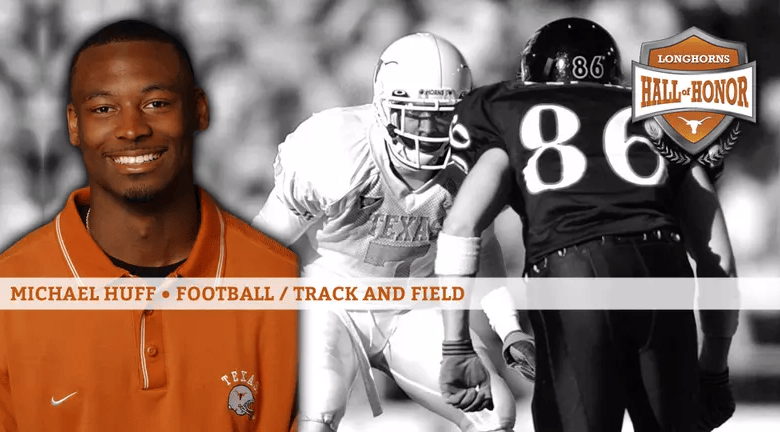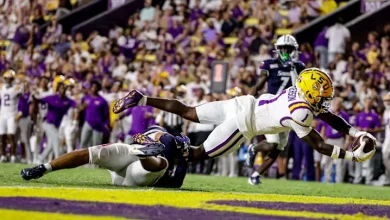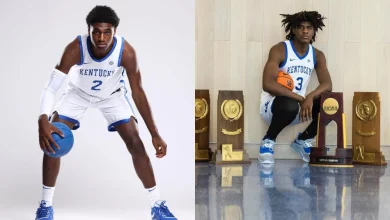Michael Huff, a Texas Longhorns icon, will be inducted into the College Football Hall of Fame.

Michael Huff, Texas Longhorns Icon, Set to be Inducted into the College Football Hall of Fame
In the world of college football, few honors hold as much prestige as being inducted into the College Football Hall of Fame. Every year, the Hall of Fame inducts a select group of individuals who have made an indelible mark on the sport, and this year, the Texas Longhorns have another reason to celebrate. Michael Huff, one of the most celebrated players in Texas football history, will be inducted into the prestigious Hall of Fame in 2025.
Huff’s induction into the Hall of Fame is a testament to his incredible career at Texas and his lasting impact on the game of college football. His remarkable talent, leadership on the field, and exceptional performances during his time with the Longhorns have earned him a permanent place among the game’s greatest. Huff joins an elite group of players, coaches, and administrators whose legacies are forever etched into the fabric of college football history.
In this article, we’ll take a deep dive into Michael Huff’s journey to the College Football Hall of Fame, recount his remarkable career at Texas, and examine the factors that contributed to his incredible success both on and off the field. We will also explore Huff’s legacy within the Longhorns program, his impact on the football community, and his continued influence in the years after his playing career ended.
The Rise of Michael Huff
Before Michael Huff became a star on the football field, he was an athletic prodigy in the state of Texas, growing up in the town of Brenham, where he played high school football and earned recognition as one of the top players in the state. Huff was a versatile athlete, excelling as a multi-sport star in football, basketball, and track. His athleticism and competitive drive were clear early on, and it was no surprise that he attracted the attention of college recruiters as he entered his senior year of high school.
Huff’s natural talent and passion for football led him to choose the University of Texas, a program known for its rich football tradition and history. At Texas, Huff quickly made a name for himself with his hard-hitting style of play, his ability to read the game, and his strong instincts on defense. His versatility was evident, as he could play multiple positions in the secondary, showcasing his ability to impact the game in various ways.
When he first joined the Longhorns as a freshman, Huff was used primarily as a cornerback but soon transitioned to safety, where his skills truly began to shine. His size, speed, and football IQ made him a standout player for the Longhorns, and he quickly became a key contributor to the team’s defense.
Huff’s Dominance at Texas: Key Highlights
Huff’s career at Texas spanned from 2002 to 2005, and during that time, he established himself as one of the most dominant defensive players in the country. His combination of size (6’0”, 210 pounds), speed, and athleticism made him a matchup nightmare for opposing offenses. But it was his high football IQ, leadership, and knack for making plays in critical moments that truly set him apart.
Throughout his time at Texas, Huff was known for being a versatile player who could line up at different positions in the secondary. He played both cornerback and safety, and his ability to cover receivers, play the run, and make plays in the passing game made him one of the most well-rounded players in college football.
Here are some of the key highlights of Huff’s remarkable career at Texas:
1. National Championship Glory in 2005
The pinnacle of Huff’s career came during his senior season in 2005, when he helped lead the Texas Longhorns to a national championship in the Rose Bowl. The game featured a showdown between Texas and the mighty USC Trojans, one of the most highly anticipated matchups in college football history. It was a game that showcased the talents of future NFL stars, including Texas quarterback Vince Young, and a game that would become a defining moment for the Texas football program.
Huff was instrumental in the Longhorns’ defense that season, playing a key role in shutting down high-powered offenses and contributing to Texas’ undefeated record. In the Rose Bowl, Huff was all over the field, making critical plays in the secondary and helping to limit USC’s offensive attack. While much of the attention that night was on Vince Young and his game-winning touchdown run, Huff’s play in the defensive backfield was a crucial part of the team’s success.
The 2005 national championship was the culmination of Huff’s incredible career at Texas, and it solidified his legacy as one of the most important players in the history of the program. It also marked the beginning of his ascent to national recognition as one of college football’s top defensive players.
2. Award-Winning Play
Huff’s individual accolades during his career are nothing short of impressive. He earned multiple All-American honors, including being named a First-Team All-American by the Associated Press and Football Writers Association of America in 2005. He was also named the Big 12 Defensive Player of the Year that season, a testament to his dominance on the field.
In addition to his conference accolades, Huff also received the prestigious Jim Thorpe Award in 2005, given annually to the nation’s best defensive back. Huff’s playmaking ability, his leadership in the secondary, and his consistent ability to shut down opposing offenses made him a favorite among award voters. The Jim Thorpe Award served as national recognition for his exceptional ability to impact games and his status as one of the premier defensive backs in college football.
Huff’s playmaking abilities were also showcased in his interception total. He finished his college career with seven interceptions, and it seemed that every time he made a play, it came in a key moment for the Longhorns. Whether it was a timely pick or a pass breakup, Huff was consistently in the right place at the right time.
3. Versatility and Leadership
One of the defining characteristics of Huff’s career was his ability to play multiple roles in the secondary. While he was primarily a safety, Huff frequently lined up at cornerback and as a nickelback, allowing Texas to take advantage of his versatility. His ability to cover receivers, defend against the run, and play deep in coverage allowed the Longhorns to use him in a variety of ways to exploit matchups.
Huff was also a vocal leader on the defense, providing the kind of leadership and intensity that inspired his teammates. His ability to read opposing offenses and make adjustments on the fly made him a leader on the field, and his competitive spirit was contagious.
Life After College: A Successful NFL Career
Following his historic career at Texas, Huff was selected in the first round of the 2006 NFL Draft by the Oakland Raiders with the 7th overall pick. Huff’s success at Texas translated to a solid NFL career, where he became one of the top safeties in the league. He played for several seasons with the Raiders before spending time with the Baltimore Ravens and Kansas City Chiefs.
During his NFL career, Huff established himself as a reliable and consistent player, known for his ability to cover ground quickly and provide impact plays in the secondary. He was known for his exceptional tackling ability and his knack for breaking up passes and creating turnovers. Although his NFL career didn’t reach the same heights as his college days, Huff remained a respected figure in professional football.
After retiring from the NFL, Huff has remained involved in the football community, working in coaching and mentoring roles, and contributing to the development of young players. His legacy continues to inspire future generations of defensive backs who look up to him as a role model for excellence on and off the field.
Huff’s Legacy at Texas
Michael Huff’s legacy at Texas goes beyond his accolades, championships, and individual awards. He is a player who helped elevate the Longhorns program to national prominence, and his contributions to the team’s success are still remembered fondly by fans, players, and coaches alike.
His leadership on and off the field helped shape the culture of Texas football during one of its most successful eras. Huff set the standard for what it meant to be a Texas Longhorn, and he is remembered as one of the best defensive players to ever wear the burnt orange and white.
Fans of Texas football will always remember Huff’s pivotal role in the Longhorns’ national championship run in 2005, but his influence goes far beyond that. Huff is a symbol of the type of player that Texas fans admire: a hard worker, a fierce competitor, and a player who leaves it all on the field.









